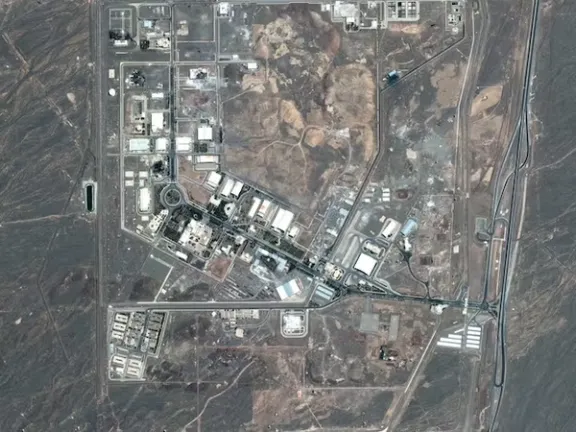US Reinforces Its Message Of Support For Israel
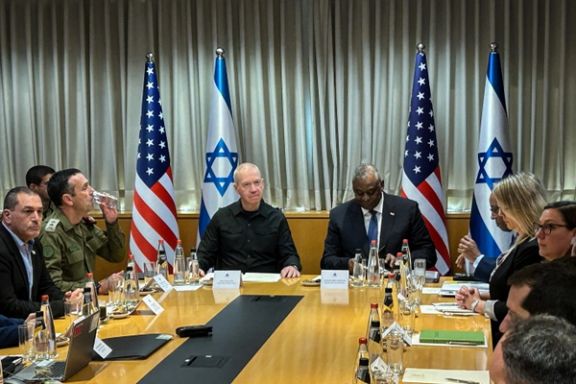
Israeli Defense Minister Yoav Gallant said on Thursday that Israel would respond directly to any attack by Iran, Amid strong messages of support by the United States.

Israeli Defense Minister Yoav Gallant said on Thursday that Israel would respond directly to any attack by Iran, Amid strong messages of support by the United States.
“A direct Iranian attack will require an appropriate Israeli response against Iran," Gallant told US Secretary of Defense Lloyd Austin, according to remarks issued by his office.
The Pentagon said the two discussed the United States' "iron-clad" commitment to Israel's security against threats from Iran and its proxies.
"Echoing President Biden's unequivocal message to Israeli Prime Minister Netanyahu, Secretary Austin assured Minister Gallant that Israel could count on full US support to defend Israel against Iranian attacks, which Tehran has publicly threatened," the Pentagon said.
It added that a visit by the top US general for the Middle East, Army General Michael "Erik" Kurilla, to Israel had been moved up so he could meet with Israeli military leadership and discuss "current security threats." Kurilla has been travelling to Israel regularly in recent months.
Republican Senator Joni Ernst, a critic of the Biden administration’s policies toward Iran, expressed gratitude for President Joe Biden’s strong message of support to Netanyahu in an interview with Iran International on Thursday.
Although Tehran has made repeated threats of a forceful response to the Israeli airstrike that killed two top IRGC generals in Damascus on April1, so far it has hesitated.

A second night of apprehension in Tehran and Tel Aviv passed eventless Thursday, as the US and Britain vowed to back Israel in case of an Iranian retaliatory attack.
Reports from American and Israeli sources pointing to a ‘significant’ operation against Israel first emerged on Wednesday and spurred regional and world leaders to call for restraint and de-escalation.
Officials from Russia, Germany (and even Australia) intervened in different ways to dissuade Iranian leaders from striking back at Israel in response to the targeting of Iran’s consulate in Damascus on April 1st, which killed seven military officers, including two top Revolutionary Guards commanders.
But Iran continues to threaten a retaliatory attack, albeit in a relatively less incendiary fashion that was originally believed.
President Joe Biden and senior officials in his administration have repeatedly affirmed “ironclad” support for Israel against Iran. An Al Jazeera report Thursday evening quoted an unnamed American official that the US does not “rule out launching joint retaliatory strikes [against Iran] with Israel if it is attacked by Iran or its proxies.”
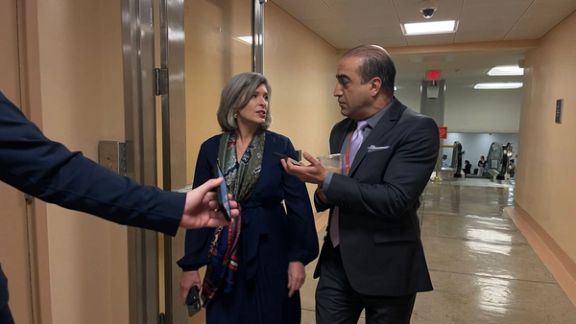
Republican Senator Joni Ernst (R-IA), a critic of the Biden administration’s policies toward Iran, expressed gratitude for President Biden’s message of support. “I think the warning was very strong. I am thankful that President Biden did that, but the proof is in the pudding; what are we going to do to step up and make sure we are defending Israel. That’s incredibly important,” told Iran International.
Reuters quoted a source familiar with US intelligence that Iran has “been very clear” that its response to the Israeli attack on its consulate in Damascus would be “controlled,” “non-escalatory,” and through “regional proxies” –as opposed to launching missiles directly from Iran. This was also reported by Politico, which suggested Iran may be calibrating its strike against Israel to send a message but not compel Washington to respond.
If true, the slight change of heart in Tehran could be the result of US warnings in public and through regional intermediaries such as Qatar and Saudi Arabia.
Iran’s Supreme Leader Ali Khamenei and his top military commanders in the IRGC know that a full-scale war with Israel could involve the US and have severe consequences that may far outweigh any gains in prestige in the Muslim world that comes with standing up to Israel.
While warning Iran that it may have to face not just Israeli army but American military might, the Biden administration is trying hard to stop a full-blown regional war.
“We continue to work to prevent escalation of the conflict in the Middle East,” State Department spokesperson Matthew Miller told in his presser Thursday. “Escalation is not in anyone's interest and countries should urge Iran not to escalate.”
Despite his best efforts to manage what can easily turn to an historic crisis, President Joe Biden faces unrelenting criticism at home for his Middle East policy.
Israel and Iran have been engaged in indirect conflict since October 7th, with Israel striking IRGC-affiliated targets in Syria, and Iran’s most powerful ally Hezbollah launching attacks across the Lebanese-Israeli border. Israel’s attack on Iran’s consulate in Damascus elevated the level of hostilities and raised concerns that direct confrontation between the two countries might be unavoidable.
“This should come as a shock to no one, but Iran is threatening Israel because they smell weakness from the Biden administration,” Congressman Brian Mast posted on X. “Iran wants escalation because they fear no consequences. Until this changes, the U.S. and our allies can only expect more aggression from Iran.”
Congresswoman Nancy Mace seconded the sentiment: “Make no mistake: @POTUS playing footsie with Iran and talking out of both sides of his mouth is the reason they feel emboldened.”
Biden critics have long blamed him and his team (his Iran team especially, led by the now suspended former Special Envoy Robert Malley) for emboldening the Iranian regime and ‘enabling’ it through released funds and loose enforcement of oil sanctions.
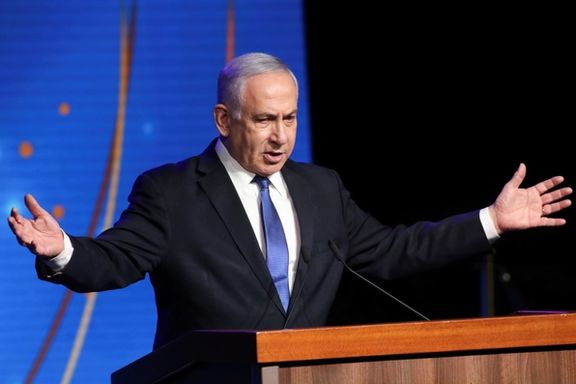
Israeli Prime Minister Benjamin Netanyahu readied the country's air forces on Thursday as Iran continues to levy threats againsts the Jewish state in the wake of its airstrike on Iran's consulate in Syria last week.
Addressing F-15 pilots in the Tel Nof air base, Netanyahu stressed that Israel has readied itself for all scenarios in the region in the wake of the most humiliating attack on Iran in recent years as the shadow war between the two states continues.
“We are in challenging times. We are in the midst of a war in Gaza that is continuing with full force. In addition, we are continuing with ceaseless efforts to return our hostages, but we are also preparing for challenges from other fronts," he said Thursday.
“We set a simple principle: Anyone who hits us, we hit them. We are ready to fulfill our responsibilities towards Israel’s security, in defense and attack."
His remarks came a day after Iran's Supreme Leader, Ali Khamenei, said that Israel "must be punished and it shall be" for the April 1 attack in Damascus, the most brazen attack on top IRGC personnel since the assassination of Quds Force chief Qassem Soleimani by the US in 2020.
The precision missile strike claimed the lives of 7 IRGC forces, including Mohammad Reza Zahedi, the highest-ranking commander of the Iranian Revolutionary Guards Quds Force (IRGC-QF) in Lebanon and Syria.
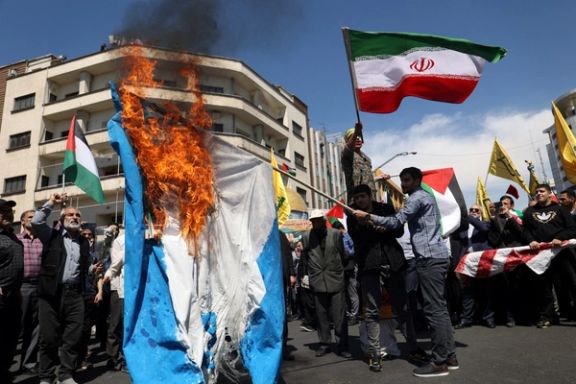
Michael Erik Kurilla, the head of US Central Command (CENTCOM), arrived in Israel where he is scheduled to meet the country’s senior military officials, including Defense Minister Yoav Gallant as the two nations, both archenemies of Iran, discuss contingency plans.
On Wednesday, the foreign ministers of Saudi Arabia, Qatar, Iraq and UAE, key economic allies of Iran amid sanctions, contacted their Iranian counterpart Hossein Amir-Abdollahian in an intervention to persuade Tehran to avoid further tensions with Israel as an Iran-led proxy war spills into the region in the wake of the October 7 Hamas invasion of Israel.
The Iran-backed militia has since been joined by Iran's proxies in Lebanon, Yemen, Iraq and Syria in attacks on both Israel and US forces in the region. The mediation of the four Arab countries was conducted at the request of Brett McGurk, the White House Middle East envoy.
Multiple international diplomats have tried to stem the tide of violence since the attack. In a phone conversation with Amir-Abdollahian, Australian Foreign Minister Penny Wong urged Tehran “to use its influence in the region to promote stability, not contribute to escalation.”
“Australia is deeply concerned by indications Iran is preparing military action against Israel,” wrote Wong on X, adding that “further conflict will only add to the devastation in the Middle East.”
Earlier in the day, German Foreign Minister Annalena Baerbock also talked to her Amir-Abdollahian and called on “all actors in the region to act responsibly and exercise maximum restraint.”
Iran, named as the biggest state sponsor of terror in last year's annual US terrorism report, lambasted the UN Security Council for failing to take action against Israel’s attacks on the IRGC targets in Syria.
“Had the UN Security Council condemned the Zionist regime’s reprehensible act of aggression on our diplomatic premises in Damascus and subsequently brought to justice its perpetrators, the imperative for Iran to punish this rogue regime might have been obviated,” Iran’s Permanent Mission to the UN stated.
According to the Financial Times, suspected Israeli strikes have claimed the lives of 18 IRGC commanders and advisers since the Gaza war broke out on October 7 as the shadow war between the two sides continues to boil over.
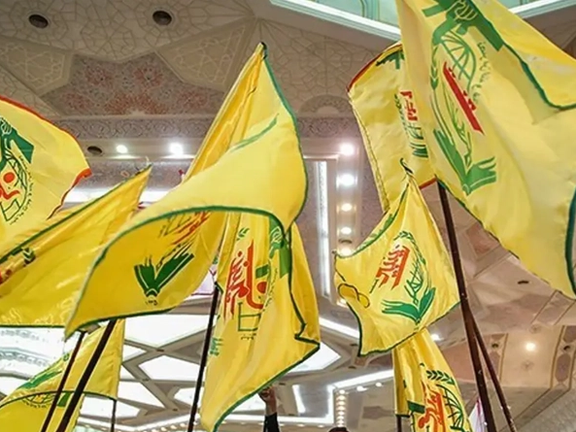
On Thursday, Islamabad designated the Zainebiyoun Brigade, an Iran-backed Shiite militant group, as a terrorist organization.
Formed by the IRGC after the Syrian civil war began, the Zainebiyoun Brigade, also known as Liwa Zainebiyoun, mobilized Pakistani Shiite militants who were then sent to fight forces opposed to Syrian ruler Bashar al-Assad, a close ally of Iran and Russia.
The Iranian regime has been an active actor in the Syrian conflict which started in 2013 and has so far claimed the lives of around 500,000 people, at least 60 percent of whom were civilians.
To help maintain Assad’s rule, Iran dispatched its other proxies to Syria as well, including Hezbollah, Iraq’s Nujaba Movement, and also the Fatemiyoun Division, which was composed of Afghan Shiite fighters.
Iranian officials and state media frequently credit former IRGC commander Qassem Soleimani as the man behind launching, training and funding all these militant groups. Soleimani, who served as the Iranian regime’s top military and intelligence operator in the Middle East, was killed in a US drone strike in January 2020 in Iraq’s capital, Baghdad.
Observers contend that Tehran’s attempts to mobilize Shiite militant groups, such as Zainebiyoun, and their active participation in the Syrian war fanned the flames of sectarian violence in the Middle East, provoking Sunni communities to employ a similar strategy in the region.
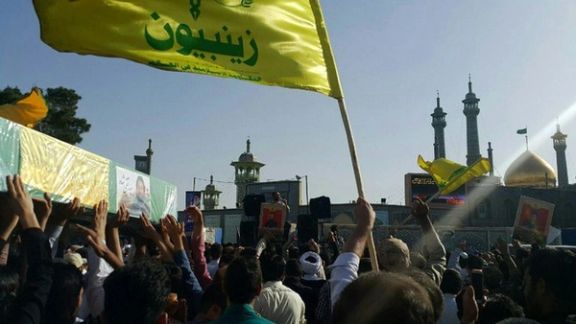
Pakistan’s decision to designate the Zainebiyoun Brigade threatens to further strain ties between Tehran and Islamabad. The two countries witnessed unprecedented tensions in January when the IRGC attacked positions in Pakistan in what it called an attempt to target terrorists. Pakistan retaliated by attacking locations in southeastern Iran.
Days after the mutual attacks, Pakistan's Counter-Terrorism Department (CTD) announced it arrested a suspect in the 2019 assassination attempt on a top Pakistani cleric, saying the suspect was a "trained terrorist" who belonged to the Zainebiyoun Brigade.
Pakistan’s CTD added that Syed Mohammad Mehdi was arrested in an operation at a bazaar in Karachi, accusing him of targeting clerics in the provincial capital and of working for Iranian intelligence.
The insurgent Sunni Baluch group known as Jaish al-Adl (Army of Justice) has been a source of tension between Iran and its nuclear neighbor, Pakistan, for years, labeled as a terrorist organization by Iran, Pakistan, and the United States.
Iranian officials have on several occasions in the past decade, including in 2019, complained that Islamabad has taken no action against the members of Jaish al-Adl finding refuge in its territory despite Iran's provision of relevant information, including locations of the militants’ hideouts.
A militant group advocating for enhanced rights and improved living conditions for the Baluch ethnic minority, Jaish al-Adl has recently intensified its operations against Iranian security forces in Sistan and Baluchistan, an economically challenged province in southeastern Iran adjacent to Afghanistan and Pakistan and home to a substantial Sunni community.
On Tuesday, six law enforcement officers were killed by Jaish al-Adl militants during an ambush on police vehicles along the Sib and Suran county route. The group also launched simultaneous attacks against military posts in Chabahar and Rask last week, killing 16 police forces.

German Foreign Minister Annalena Baerbock called for de-escalation in the region amid an Iran-led proxy war, in a call with his Iranian counterpart.
“No one can have an interest in a wider regional escalation. We urge all actors in the region to act responsibly and exercise maximum restraint,” German Foreign Ministry wrote on X following the phone call with Hossein Amir-Abdollahian on Thursday.
Tensions have risen between Iran and Israel, two archenemies, since Israel’s deadly April 1 strike on the Iranian embassy compound in Damascus and subsequently, Tehran’s daily threats to retaliate. Two IRGC commanders were killed along with other key personnel.
On Wednesday, the foreign ministers of Saudi Arabia, Qatar, Iraq and UAE contacted their Iranian counterpart in an attempt to persuade Tehran to avoid further tensions with Israel.
The mediation of the four Arab countries was conducted at the request of Brett McGurk, the White House Middle East envoy.
Meanwhile, Russia warned all sides against wider tensions in the region.
"Right now it's very important for everyone to maintain restraint so as not to lead to a complete destabilization of the situation in the region, which doesn't exactly shine with stability and predictability," Kremlin spokesperson Dmitry Peskov stressed.
Earlier in the day, Russia told its citizens not to travel to the Middle East amid rising tensions.
Bloomberg reported on Wednesday that a major missile or drone attack by Iran or its proxies on Israel seems imminent in the coming days.
On Thursday, Israeli Prime Minister Benjamin Netanyahu said the country is ready for all scenarios in the region: "Whoever harms us, we will harm them. We are prepared to meet all of the security needs of the State of Israel, both defensively and offensively.”

Russia has advised citizens not to travel to the Middle East as a regional proxy war orchestrated by Iran continues to escalate.
“We strongly recommend that Russian citizens refrain from traveling to the region, especially to Israel, Lebanon and the Palestinian territories, except in cases of extreme necessity,” read the statement issued Thursday by the Russian Foreign Ministry.
In October, Russia issued a similar travel warning after Iran-backed Hamas militants attacked Israel, killing around 1,200 people and abducting at least 250 hostages to the Gaza Strip.
“The tense situation in the Middle East region persists … The situation in the Palestinian-Israeli conflict zone, as well as in the area of the ‘Blue Line’ between Lebanon and Israel, remains unstable,” added Russian Foreign Ministry in its Thursday statement.
The announcement came hours after German airlines Lufthansa suspended flights to and from Tehran for 24 hours amid concerns of a potential military escalation.
Iran has been threatening to retaliate against an Israeli precision missile strike on April 1 that killed two top IRGC generals and five other officers in the Iranian consulate compound in Syrian capital Damascus.
On Wednesday, Iran's Supreme Leader, Ali Khamenei, said that Israel "must be punished and it shall be" for the deadly offensive.
Since the Hamas invasion of Israel, Iran's proxies in Yemen, Syria, Iraq and Lebanon have become embroiled in the proxy war against Israeli and US targets.
Citing unnamed American and Israeli officials, Bloomberg reported on Wednesday that a major missile or drone attack by Iran or its proxies on Israel seems imminent in the coming days.
Meanwhile, Israeli Foreign Minister Israel Katz warned that Israel will respond if Iran attacks Israel from its own soil. "If Iran attacks from its own territory, Israel will respond and attack in Iran," he wrote on X.
